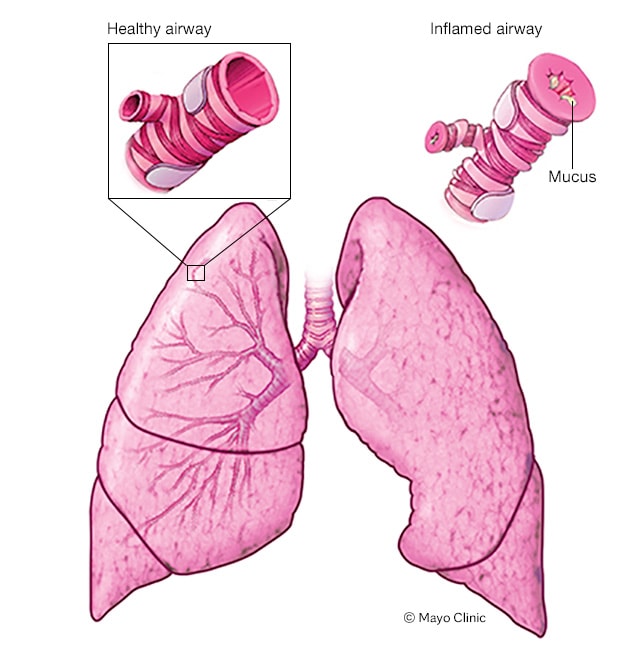10 asthma facts
We will describe 10 facts about asthma.
1. What is asthma?
It is a chronic respiratory condition that affects the airways, making them inflamed and narrowed, leading to symptoms such as wheezing, coughing, chest tightness, and difficulty breathing.

Airways in an asthma attack
A key characteristic of asthma is that the airway narrowing is reversible, and the airways go back to normal between attacks. This makes it different from COPD where the airways may be tighter than normal all the time (and further tightened during attacks).
2. Asthma triggers
These can vary from person to person, but common triggers include allergens (such as pollen, dust mites, pet dander), respiratory infections, smoking, air pollution, exercise, stress, and certain medications.
3. Prevalence of asthma
It is a very common disease. In the UK, over 8 million people, or approximately 12% of the population, have had asthma at some time. However, some may have grown out of the condition, and about 5.5 million people are receiving asthma treatment (under 10%). Prevalence has been increasing over the past few decades, especially in urban areas
4. Asthma can start at any age
Typically it develops during childhood, but it can affect any age. More boys have asthma than girls, but it’s more common in women than in men.
:max_bytes(150000):strip_icc()/VWH-Laura-Porter-Complications-of-Asthma-Standard-86207436ba0c4221a802f66a66b9b720.jpg)
5. Smoking
Teens and adults who smoke are more likely to get asthma. And there is strong evidence that second-hand smoke plays a role as well. Children who are around people who smoke have a higher chance of getting asthma early in life.
6. School and work absenteeism
Asthma is a leading cause. And it can significantly impact a person’s quality of life and daily activities if not properly managed.
Many children with asthma have a family history of the condition or other allergic conditions, such as eczema or hay fever.
7. Treatment
There is no cure for asthma. But it can be managed through medical care, including medication (such as bronchodilator inhalers and corticosteroids), avoiding triggers, and having an asthma action plan in place.
8. Early warning signs
Sometimes, asthma will cause less dramatic symptoms initially. You may cough a lot (especially at night), have a hard time sleeping, feel drained for no reason, or seem out of breath. These will not stop your day, but they can be warning signs that a full-on asthma attack is coming.
9. Asthma attacks
Also known as ‘asthma exacerbations’, vary from mild to severe to life threatening. They may require emergency medical attention (see below); and so it is important for people with asthma to be aware of the signs and symptoms of an impending attack (above).
10. When to call 999 or go to A&E
If you are too breathless to walk or talk, your lips or fingernails look blue, or using a inhaler does not help, your body is not getting enough oxygen. You will need emergency hospital treatment to help open your airways and get your oxygen levels back up. You will also need treatment if you have an asthma plan and are in the red.
Summary
We have described 10 facts about asthma. We hope you understand it better now.
Last Reviewed on 25 June 2024
